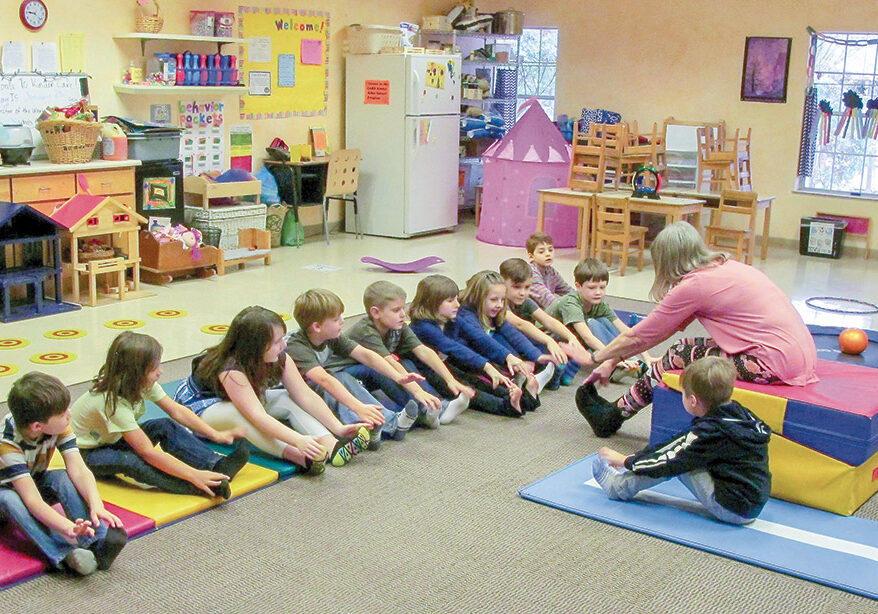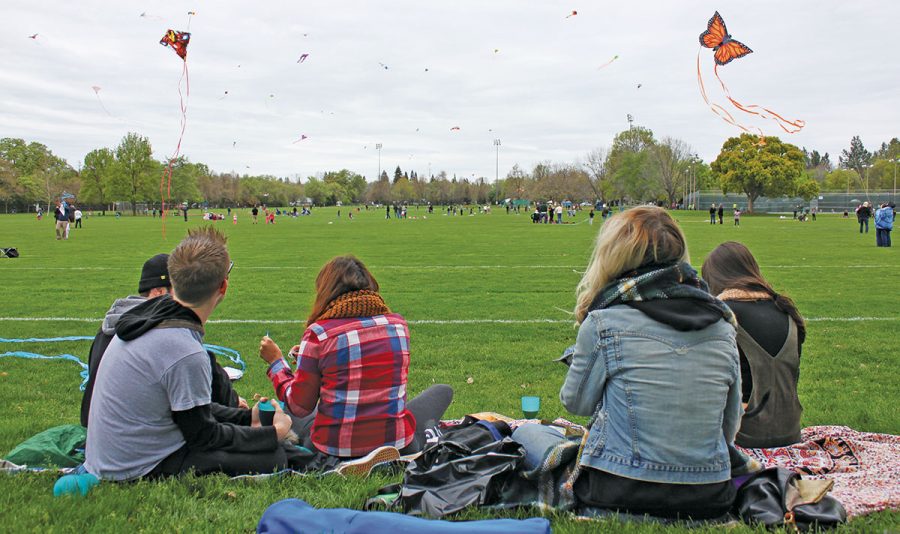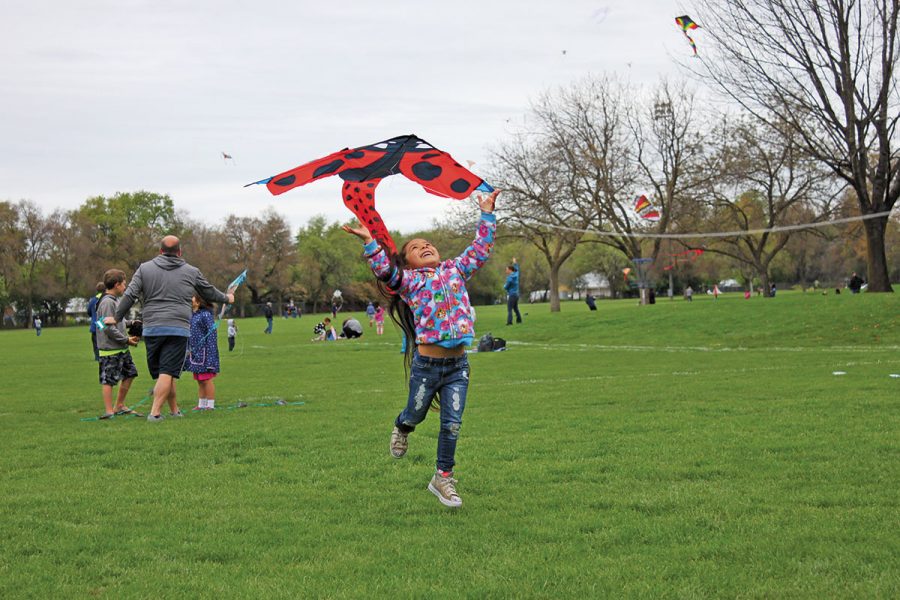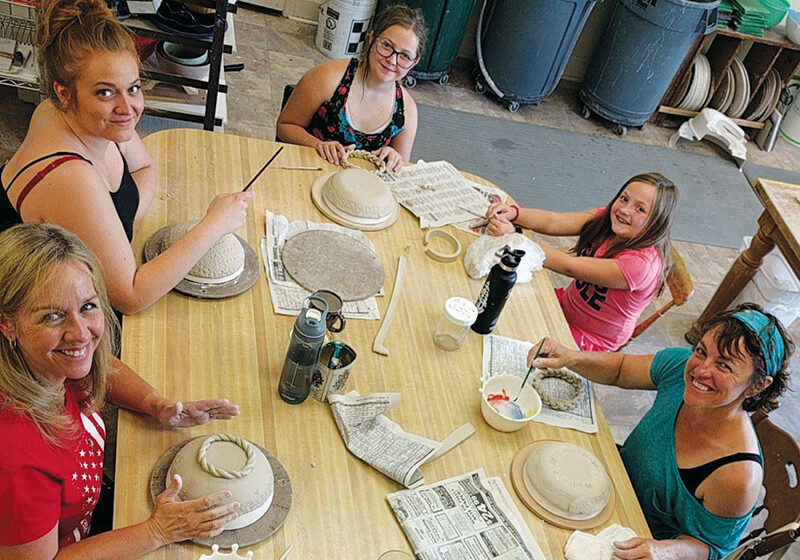Chico Kite Day
Holding the Wind in Your Hand
Springtime winds whip up the magical ability to “fly with your feet on the ground,” as Bob Malowney, owner of Chico’s Bird in Hand, puts it. In 1985, Bob gathered fellow kite enthusiasts partnering with Chico Area Recreation District (CARD) to create Kite Day, now one of Chico’s favorite springtime traditions. The annual event, held on the third or fourth Sunday of March, beckons families out of doors and onto the blustery fields of Chico’s Community Park, kites and picnic baskets in tow, for what Bob poetically describes as “meditation on a string” and “a chance to hold the wind in your hand.”
Bob’s world has always included kite-flying. When he was a child, his three older siblings would pitch in together to buy him a new kite for his birthday each March. In his view, kite-flying appeals to all ages because it’s simple and colorful, but also because it requires science and skill to keep a kite aloft. Bob has even flown a kite in a school gymnasium – with no wind. “You have to cheat the edges of physics,” he chuckles, “but you can do it!”

For every spring of their lives, Mason (11) and McKenna (13) Winzez have attended Chico Kite Day, initiated by their grandfather Bob Malowney, longtime owner of Chico’s treasured Bird in Hand shop. Photo by Kyle Nelson Photography.
Kites developed independently in many cultures, so no one part of the world can claim exclusive rights to the invention. For thousands of years, kites have been used for fun, but also as tools. Bob describes the fascinating historical use of fishing kites in Micronesia, for example. Fishermen avoided scaring fish away by attaching hooks to leaves and flying them over the water. These primitive kites belonged to the flat kite family, the simplest type of kite, pushed by wind and controlled by a bridle that adjusts the angle of the kite to shoot it up or bring it down.
Box kites use horizontal planes for lifting and vertical posts for stability, effectively locking in the wind to stay aloft. A properly built box kite can fly in 50-60 mile-per-hour winds. Box kites have contributed to a wide variety of technologies. “The history of kites is basically the history of flight,” Bob says. “The Wright Brothers flew their device as a tethered kite before they put a motor on it, and a biplane operates under the same principles as a box kite.” In the early 1900s, Samuel Franklin Cody designed the Cody War Kite to carry men into the sky for military observation purposes. Though it sounds nearly comical today, Cody’s invention played a brief but shining role as cutting-edge technology in the development of military air strategy. It improved upon the slow, easy-to-shoot hot air balloon and preceded early airplanes.
Box kites were also used by the United States Weather Service. In fact, until the 1920s, Red Bluff’s weather station paid men to measure wind speed from two kites tethered to the buildings.
The last 80 years have introduced two new kinds of kites. The Delta kite, a V-shaped kite developed by a NASA engineer in the late 1940s, uses modern materials like nylon and plastic to make it so flexible it is nearly indestructible. Parafoil kites, patented by Canadian inventor Domina Jalbert in 1966, are air-filled wings that give flight to windsurfers and cliff-jumpers. Jalbert also developed ram air parachutes which are an improvement on parachutes and yet another twist on flying a kite.
The months of March and April are particularly good for kite-flying in the North State. Bob recommends Delta kites if you’re looking for surer success, and adds that top-quality kites that cost $250 twenty years ago now cost as little as $30. Bird in Hand carries a variety of kites and employees can recommend the best kite for your family. Even cheap kites can afford families a fun afternoon; many dollar stores sell kites that will sail happily for several hours in light winds.
This year’s Kite Day is Sunday, March 25th, at Chico’s Community Park (1900 Dr. Martin Luther King Jr. Parkway) from 11 am to 4 pm. If you can’t make it to the park on Kite Day, or if you don’t live in the Chico area, don’t let that stop you from getting out with a kite. As Bob says, “the goal is simply to get parents to take their kids out and fly.”
Even More Kite Day Fun
- For even more Kite Day fun, check out Fly Me to the Ranch Family Kite Day at Patrick Ranch Museum, Saturday March 3, 11am-1pm.
- As an extra special treat, William Augros, an Osher Lifelong Learning Instructor (OLLI), will be on hand to talk about the history of kites and the construction of a variety of kites; plus he will give a demonstration on kite making.
- You also can build your own kite or purchase pre-made kites as well as explore other crafts. Admission is $2 per person. 10381 Midway, Durham. (530) 342-4359. http://www.patrickranchmuseum.org
- Beautiful kites can also be purchased at Raven Tree, a Wild Bird & Nature Shop in Mt. Shasta where you will find many delightfully wild things to tickle your fancy. 138 Morgan Way. (530) 926-6695. http://www.raventreeshop.com
Posted in: Community
Comment Policy: All viewpoints are welcome, but comments should remain relevant. Personal attacks, profanity, and aggressive behavior are not allowed. No spam, advertising, or promoting of products/services. Please, only use your real name and limit the amount of links submitted in your comment.
You Might Also Like...

Movement Jumpstarts the Brain – Flipping the Learning Switch at Blue Oak School with S’cool Moves
“Our highest endeavor must be to develop free human beings who are able, of themselves, to impart purpose and direction to their lives.” Rudolf Steiner (1861-1925) Today, parents have choices […]

3 Easy Day Hikes for the Whole Family
Get Out and Get Hiking! The North State hosts a wide variety of trails suitable for day hikers of all abilities, from toddlers to gung-ho adults. I should know. I’m […]
Not Just About Animals … 17 Great Things About 4-H
In my family, our search for different activities for our children led us to 4-H. We discovered the program offers much more than experiences in farming and raising animals, which […]

Family New Year’s Resolutions With Big Rewards
Six easy, enjoyable family resolutions As this year ends, the promise of new possibilities emerges with the coming of a new year. In addition to personal goals, many parents set […]




